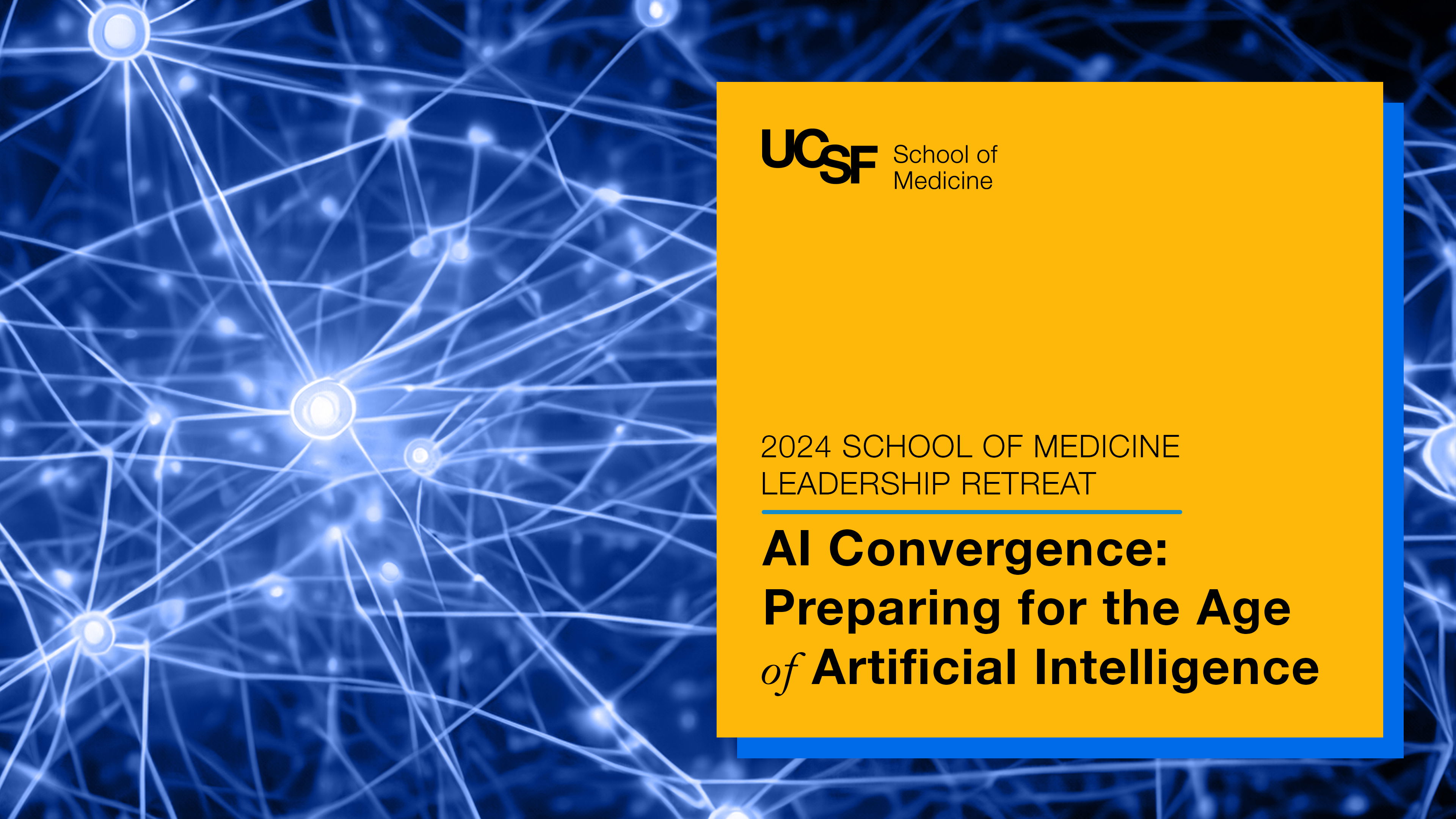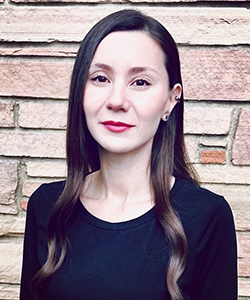
Retreat Report: An Artificial Intelligence Powered Future
As an outcome from the 2024 Leadership Retreat, we created a Retreat Report that highlights key takeaways and links to current UCSF work in AI. The report also provides ideas for how we might think about incorporating AI across our mission areas.
Agenda
Topic
Artificial Intelligence is revolutionizing the way we approach research, education, and clinical care. From data analysis in research to learning experiences for medical students and diagnosis and treatment in clinical settings, AI is reshaping the landscape of our work. This retreat aims to foster collaborative discussions on how we, as leaders in the School of Medicine, can harness the power of AI to advance our research, education, and clinical care missions, and instill equity and community from the start.
At the retreat we will:
-
Seek to understand the fundamentals of artificial intelligence and how it contributes to our work across mission areas.
-
Explore the current landscape of AI at UCSF and promote better connections to this landscape.
-
Devise strategies to enable the School of Medicine to make an impact in this space.
Thursday, February 1, 2024
Mission Bay, Genentech Hall, Byers Auditorium, 600 16th Street
5:00 pm - 7:30 pm
Complementary Parking: Please park in the Rutter Community Center Garage, 65 Owens St. After parking, click this link, enter your license plate number, and click “Park”.
| 5:00-6:15pm | Keynote Speaker: Stuart Russell, PhD |
| 6:15-6:45pm | Poster Session and Reception: Round 1 |
| 6:45-7:15pm | Poster Session and Reception: Round 2 |
Friday, February 2, 2024
Hotel Nikko, Rooms Nikko I&II, 222 Mason St
7:30 am - 4:30 pm
Validated Parking: For validated parking, please park in the garage around the corner from Hotel Nikko at 233 Ellis Street. Upon entry, tell the attendant you are with UCSF. Bring your ticket to registration for our team to validate.
| 7:30-8:00am | Registration and Continental Breakfast |
| 8:00-8:15am | Dean's Opening Remarks: Dean Talmadge E. King, Jr., MD |
| 8:15-9:15am | Keynote: The Emergence of Generative AI for Healthcare and Medicine: Peter Lee, PhD |
| 9:15-9:30am | Break |
| 9:30-9:35am | Orientation to UCSF's AI Landscape: Ida Sim, MD, PhD |
| 9:35-10:35am |
AI Platforms - Ki Lai, MS, and Sara Murray, MD
|
| 10:35-10:50am | Break |
| 10:50-11:50am |
UCSF Computing Ecosystem - Sharat Israni, PhD, and Mandy Terrill
|
| 11:50-12:50pm | Lunch |
| 12:50-1:55pm |
Ensuring Trustworthy AI - Panel Discussion: Joe Bengfort (moderator), Marc Kohli, MD, Sara Murray, MD
|
| 1:55-2:10pm | Break |
| 2:10-3:10pm | Break Out Groups: Leveraging AI to Advance Our Mission |
| 3:10-3:25pm | Break |
| 3:25-4:25pm | Keynote: Artificial Intelligence, Bias, and Ethics: Aylin Caliskan, PhD |
| 4:25-4:35pm | Closing Remarks: Dean Talmadge E. King, Jr., MD |
Keynote Speaker bios below; UCSF Speaker bios here.
Keynote Speakers

Aylin Caliskan, PhD

Peter Lee, PhD

Stuart Russell, PhD
Aylin Caliskan, PhD
Aylin Caliskan is an Assistant Professor at the University of Washington Information School and an Adjunct Assistant Professor at the Paul G. Allen School of Computer Science and Engineering. Previously, Caliskan was an Assistant Professor of Computer Science at George Washington University. Caliskan studies the underpinning mechanisms of information transfer between human society and artificial intelligence (AI). Specifically, Caliskan's research interests lie in AI ethics, AI bias, computer vision, natural language processing, and machine learning. By developing transparency enhancing algorithms that detect and quantify human-like associations and biases learned by machines, Caliskan investigates the reasoning behind AI representations and decisions. Caliskan's publication in Science demonstrated how semantics derived from language corpora contain human-like biases. Her work on machine learning's impact on fairness and privacy received the best talk and best paper awards, and she was selected as a Rising Star in EECS at Stanford University. Caliskan holds a Ph.D. in Computer Science from Drexel University's College of Computing & Informatics and a Master of Science in Robotics from the University of Pennsylvania. Caliskan was a Postdoctoral Researcher and a Fellow at Princeton University's Center for Information Technology Policy. Caliskan was named a Nonresident Fellow in Governance Studies at the Brookings Institution in 2021, and in 2023, she was recognized as one of the 100 Brilliant Women in AI Ethics and honored with an IJCAI Early Career Spotlight.
Peter Lee, PhD
Dr. Peter Lee is Corporate Vice President of Research and Incubations at Microsoft. He leads Microsoft Research and incubates new research-powered products and lines of business in areas such as artificial intelligence, computing foundations, health, and life sciences. He speaks and writes widely on science and technology trends. Before joining Microsoft in 2010, he was at DARPA, where he established a new technology office that created operational capabilities in machine learning, data science, and computational social science. Prior to that, he was a professor and the head of the computer science department at Carnegie Mellon University. Dr. Lee is a member of the National Academy of Medicine and serves on the Boards of Directors of several institutes for the Allen Institute for Artificial Intelligence, the Brotman Baty Institute for Precision Medicine, and the Kaiser Permanente Bernard J. Tyson School of Medicine. He served on President Obama’s Commission on Enhancing National Cybersecurity and led studies for PCAST and the National Academies. He has testified before both the US House Science and Technology Committee and the US Senate Commerce Committee. With Carey Goldberg and Dr. Isaac Kohane, he is the coauthor of the book, “The AI Revolution in Medicine: GPT-4 and Beyond.”
Stuart Russell, PhD
Stuart Russell is a Professor of Computer Science at the University of California at Berkeley, holder of the Smith-Zadeh Chair in Engineering, and Director of the Center for Human-Compatible AI and the Kavli Center for Ethics, Science, and the Public. He is a recipient of the IJCAI Computers and Thought Award, the IJCAI Research Excellence Award, and the ACM Allen Newell Award. From 2012-14 he held the Chaire Blaise Pascal in Paris. In 2021 he received the OBE from Her Majesty Queen Elizabeth and gave the BBC Reith Lectures. He is an Honorary Fellow of Wadham College, Oxford, an Andrew Carnegie Fellow, an AI2050 Senior Fellow, and a Fellow of AAAI, ACM, and AAAS. His book "Artificial Intelligence: A Modern Approach" (with Peter Norvig) is the standard text in AI, used in over 1500 universities in 135 countries. His research covers a wide range of topics in artificial intelligence, with a current emphasis on the long-term future of artificial intelligence and its relation to humanity. He has developed a new global seismic monitoring system for the nuclear-test-ban treaty and is currently working to ban lethal autonomous weapons.
Retreat Pre-Work
Article Discussion Groups and Versa Assignment
Retreat Pre-Work
In advance of the retreat we have a few pre-work assignments for attendees to engage with.
- Versa: Each attendee has been provided access to Versa, UCSF's internal AI platform. Prior to the retreat, we ask that attendees become familiar with how Versa works by completing a short assignment.
- Article Discussion Groups: We have curated a few articles to read in advance and have scheduled meetings to discuss the articles.
| Date | Leader | Article or Book |
|
1/16 9:10am |
Jay Debnath, MD |
"Foundation models for generalist medical artificial intelligence" |
|
1/16 12:10pm |
Priya Joshi, MD |
"AI in Medicine: Benefits, Limits, and Risks of GPT-4 as an AI Chatbot for Medicine" |
|
1/17 11:10am |
Dave Morgan, PhD |
Human Compatible |
|
1/18 12:10pm |
Tony Capra, PhD |
"Effective gene expression prediction fromsequence by integrating long-range interactions" |
|
1/18 2:40pm |
|
"Artificial Intelligence - from starting pilots to scalable privilege" |
|
1/19 12:10pm |
Ida Sim, MD, PhD |
"My North Star for the Future of AI" |
|
1/22 12:10pm |
Ralph Gonzales, MD |
"AI in Medicine: Benefits, Limits, and Risks of GPT-4 as an AI Chatbot for Medicine" |
|
1/23 9:10am |
Marc Kohli, MD |
"AI recognition of patient race in medical imaging: a modelling study" |
|
1/24 11:10am |
Christy Boscardin & |
"ChatGPT and generative artificial intelligence for medical education: potential impact |
|
1/25 11:10am |
Romain Pirracchio, MD, PhD |
"Assessment of Machine Learning to Estimate the Individual Treatment Effect |
|
1/26 12:10pm |
Olivia Herbert, MBA |
Human Compatible |
If you have not recieved your retreat pre-work, please contact Stephanie Belger.
